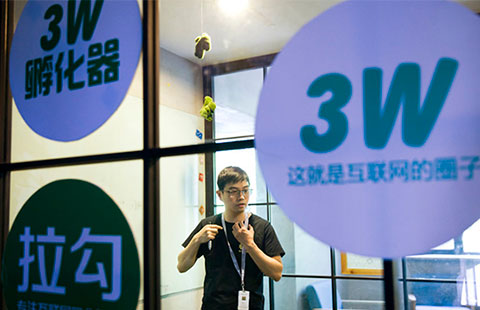Downgrades loom large as growth slows
By ZHENG YANGPENG (China Daily) Updated: 2015-06-13 09:08Number of companies on default list swells as $12b of debt accrues for payment this year
A wave of credit downgrades is expected to hit corporate bond issuers as a slowing economy weighs on their finances.
The looming downgrades reflect the lagged impact of a broad deterioration of corporate financial conditions over the past year, analysts said.
Bond issuers, many of which are not listed, were required by regulators to release their annual results by April 30. The credit rating agencies, in turn, are supposed to update their rankings 60 to 90 days thereafter.
That timeline makes June and July a peak time for upgrades or downgrades, and the picture this year is not pretty.
The number of companies on the "default watch" list has swelled, with $12 billion of debt falling due this year, data compiled by Bloomberg showed. Another $1.4 billion of issues was postponed or canceled outright so far this month after a string of defaults pushed up borrowing costs, the data showed.
Wu Jin, vice-president of China Chengxin International Credit Rating Co Ltd, told a conference on Wednesday that from January to May, his firm doubled the number of downgrades compared with the previous year, and there are more to come.
"Downgrades" accounted for more than 40 percent of the total adjustments, up from less than 30 percent a year ago, he said. Of the 2,900 bond issuers with outstanding debt, 2,500 have released their 2014 results so far, according to China International Capital Corp. Only 450(18 percent) had their ratings updated before the end of May. About 2,100 updates are due this month and next.
Three-quarters of the companies that have not released their reports are local governments' off-balance sheet financing vehicles, according to CICC. These issuers are widely believed to have weaker governance and a heavy reliance on land revenues to cover their interest payments.
As the property market downturn has slashed land sale revenues and depressed the value of land used as collateral, they might face more down grade pressure.
"Credit fundamentals of issuers began to deteriorate as early as 2012. The explosive growth of downgrades is attributed to various factors: The economic slowdown, the extensive debt falling due and a growing number of issuers," said Chen Jianheng, an analyst with CICC.
Last year there was just one default. So far this year four firms have reneged on onshore notes. One was power equipment producer Baoding Tianwei Group Co, which in April became the first State owned enterprise to default. Zhuhai Zhongfu Enterprise Co, which makes bottles for Coca-Cola Co, only repaid a portion of bonds due in May.
Markets and investors are closely following whether Guangxi Nonferrous Metal Group Co will miss payments on its 1.3 billion yuan ($211.7 million) in medium-term notes due this Saturday, becoming the second SOE to default after Baoding Tianwei.
Tianwei Yingli New Energy Resources Co is also believed to face repayment risks when 1 billion yuan of bonds comes due in October.
Domestic credit agencies awarded a narrower range of ratings for issuers compared with their international counterparts, as 69 percent of corporate issuers were in the AA category by the end of 2014, according to Fitch Ratings Inc.
- Mainland credit-rating network takes shape
- The impact of the American credit rating downgrade on China
- Can Hong Kong afford a credit rating cut?
- Karamay launches third party credit rating system
- Dagong Europe pushes credit rating business
- Dagong maintains sovereign credit rating for Australia
- New global credit rating agency
- VW Finance China partners 5 major dealer groups
- China sees more firms established
- US sets final dumping margins on Chinese tires
- Tiny firms lack access to funding, says study
- China, S. Asian ties 'never more important' as global trade patterns change
- Embraer denies unit closure reports
- Audit office set to check on progress of local projects
- Enel CEO says China's CNNC likely to bid for Slovenske stake

















